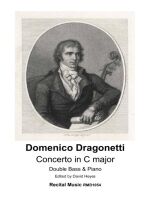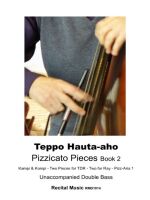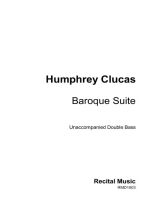Solos Book 1

Product code:
£12.50
Description
Solos Book 1 brings together six exciting and vibrant pieces for unaccompanied double bass and is aimed at the intermediate-advanced bassist. Each piece offers musical and technical challenges in equal measure, demonstrating the potential and possibilities of the double bass throughout its entire solo range.
Miloslav Gajdoš is an acknowledged master at writing engaging, virtuosic and idiomatic music for unaccompanied double bass, and this is the first volume in a series to expand the solo repertoire for bassists of all ages.
Prelude & Fugue in A Minor is dedicated to the double bass students at Wells Cathedral School (Somerset, UK) and was composed in 1998, shortly after the composer’s first visit to England as the guest soloist at the 1st Wells Double Bass Weekend. In two contrasting movements, which can also be performed separately, there are many challenges, including two, three and four-part chords and an opportunity to demonstrate a musical and technical prowess.
Capriccio in D minor was composed in 1978, originally entitled Capriccio No.1, and revised in 1988. It requires advanced technical, musical and bowing skills throughout the solo range of the double bass, and the opening music, which is striking and bold, contrasts a lyrical and cantabile middle section which makes use of many double stops. Capriccio in D minor is an amazing showstopper which would astound any audience.
Klezmer was composed in 2014 and is based on a traditional Jewish melody. The music is colourful and inventive, exploring a range of colours and timbres primarily in the solo register, with opportunities to demonstrate more than simply a technical prowess.
Koussevitsky “I have great respect for Serge Koussevitsky’s compositions, whether he wrote them himself or in collaboration with Reinhold Glière and are performed by great artists, but also by students of music schools. In my composition for solo double bass, composed in 2022, I tried to capture the characteristic features of these compositions, such as warm melodiousness, lively rhythms and interesting modulations. Excerpts from Koussevitsky’s miniatures and also from his Concerto in F sharp minor are successively cited, however, the style of the double bass playing is moved to a higher technical level by the frequent use of double stops, chords and a hint of polyphonic playing.” [MG]
Kuchynka “In this short work I used three themes from Kuchynka’s music. The first is from Touha (Desire) for double bass and piano, first published by Urbánek in Prague in 1935, also with a version for violoncello by F. Berka and dedicated to J. Votruba. This highly romantic piece has a similar emotional intensity to the Romance for violin by Johann Svendsen. The second part contrasts with a waltz-tempo theme. After a brief recitative, before the finale, there is a reference from Kuchynka’s Fantasie on Smetana’s opera ‘The Bartered Bride’ – the chorus “Why wouldn’t we look forward to it.” [MG]
Toccata was composed in 2018 as the imposed work for the 8th International Dittersdorf Double Bass Competition in Banská Bystrica (Slovakia) to demonstrate the technical potential of the double bass alongside lyrical melodies with a deep emotional content.
Description
Solos Book 1 brings together six exciting and vibrant pieces for unaccompanied double bass and is aimed at the intermediate-advanced bassist. Each piece offers musical and technical challenges in equal measure, demonstrating the potential and possibilities of the double bass throughout its entire solo range.
Miloslav Gajdoš is an acknowledged master at writing engaging, virtuosic and idiomatic music for unaccompanied double bass, and this is the first volume in a series to expand the solo repertoire for bassists of all ages.
Prelude & Fugue in A Minor is dedicated to the double bass students at Wells Cathedral School (Somerset, UK) and was composed in 1998, shortly after the composer’s first visit to England as the guest soloist at the 1st Wells Double Bass Weekend. In two contrasting movements, which can also be performed separately, there are many challenges, including two, three and four-part chords and an opportunity to demonstrate a musical and technical prowess.
Capriccio in D minor was composed in 1978, originally entitled Capriccio No.1, and revised in 1988. It requires advanced technical, musical and bowing skills throughout the solo range of the double bass, and the opening music, which is striking and bold, contrasts a lyrical and cantabile middle section which makes use of many double stops. Capriccio in D minor is an amazing showstopper which would astound any audience.
Klezmer was composed in 2014 and is based on a traditional Jewish melody. The music is colourful and inventive, exploring a range of colours and timbres primarily in the solo register, with opportunities to demonstrate more than simply a technical prowess.
Koussevitsky “I have great respect for Serge Koussevitsky’s compositions, whether he wrote them himself or in collaboration with Reinhold Glière and are performed by great artists, but also by students of music schools. In my composition for solo double bass, composed in 2022, I tried to capture the characteristic features of these compositions, such as warm melodiousness, lively rhythms and interesting modulations. Excerpts from Koussevitsky’s miniatures and also from his Concerto in F sharp minor are successively cited, however, the style of the double bass playing is moved to a higher technical level by the frequent use of double stops, chords and a hint of polyphonic playing.” [MG]
Kuchynka “In this short work I used three themes from Kuchynka’s music. The first is from Touha (Desire) for double bass and piano, first published by Urbánek in Prague in 1935, also with a version for violoncello by F. Berka and dedicated to J. Votruba. This highly romantic piece has a similar emotional intensity to the Romance for violin by Johann Svendsen. The second part contrasts with a waltz-tempo theme. After a brief recitative, before the finale, there is a reference from Kuchynka’s Fantasie on Smetana’s opera ‘The Bartered Bride’ – the chorus “Why wouldn’t we look forward to it.” [MG]
Toccata was composed in 2018 as the imposed work for the 8th International Dittersdorf Double Bass Competition in Banská Bystrica (Slovakia) to demonstrate the technical potential of the double bass alongside lyrical melodies with a deep emotional content.



